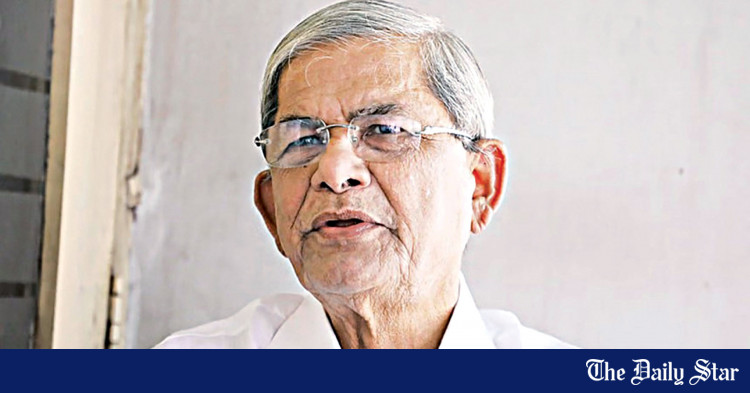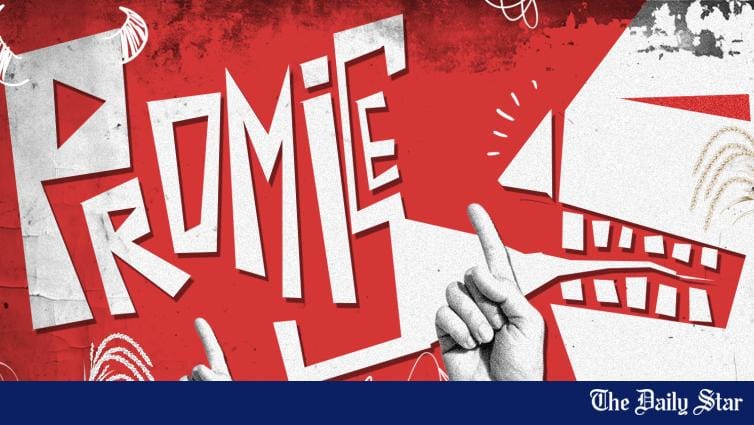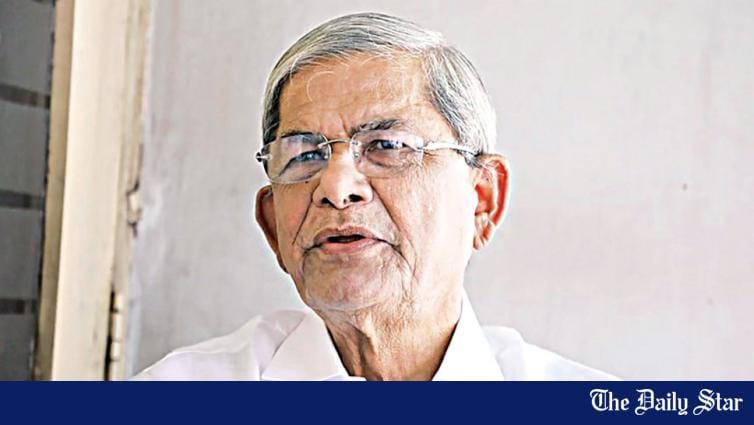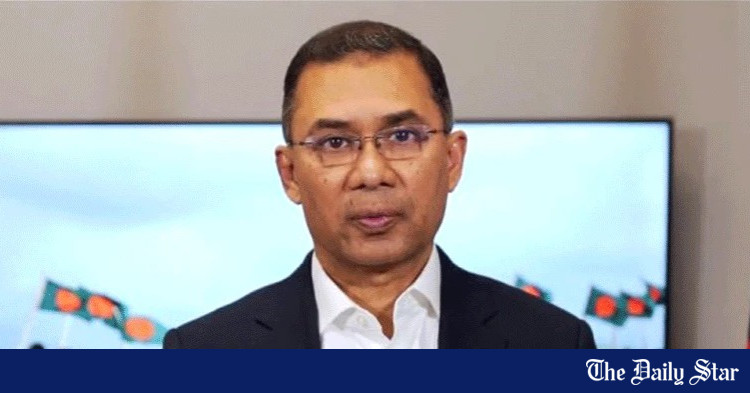The wrongs of past 15yrs must be righted
Says Mirza Fakhrul
Having been the main opposition camp over the last 15 years, the BNP has been advocating for quick reforms followed by elections. The Daily Star's Golam Mortoza caught up with the party's Secretary General Mirza Fakhrul Islam Alamgir to talk about a host of issues ranging from elections to media freedom.
TDS: As the secretary general of one of Bangladesh's largest political parties, what are your thoughts on the current political situation. A successful mass uprising has taken place, and an interim government has taken over. Your party has been calling for elections within a timeframe that is both "quick" and "reasonable." Could you clarify what you mean by "quick" and "reasonable"?
Fakhrul: Over 15 years of authoritarian rule destroyed the bureaucratic and political structures of Bangladesh. The institutions essential for a democratic state have been systematically ruined. As a result, following the student-led mass uprising, public expectations have skyrocketed. The primary expectation now is that this government will hold a fair and credible election, enabling people to form a parliament and government of their choice.
There is also another expectation -- to right all the wrongs done during this long bout of misrule.
TDS: How would you define a reasonable timeframe?
Fakhrul: There are a few minimum requirements. For instance, the electoral system needs to be reformed to enable free and fair elections. The heavily politicised bureaucracy must be overhauled to make it neutral and capable of facilitating a credible election. Similarly, the judiciary, which has been politicised, needs to be reformed to the extent possible. Complete reform might not be achievable immediately, especially at the grassroots level, but these steps are critical.
TDS: Your acting chairperson, Tarique Rahman, has also spoken about this logical timeframe, making it clear that there's no rush. However, some of your party leaders have mentioned that elections should be held by March or April, leading to some confusion. What is BNP's official position on this?
Fakhrul: We don't want to specify exact dates or deadlines because, as a party, we're being pragmatic. There may be some flexibility with the timeline, but elections must be held as quickly as possible for the good of the country and its people.
Having been in government ourselves, we understand that reforms require some time. However, we insist on timely elections because only an elected government can ensure legitimacy. The mandate of an elected government is entirely different from that of an interim administration. When we interact with foreign stakeholders, investors, and industrialists, they often express concerns about investing during the tenure of a temporary government. Timely elections will resolve many of these issues.
TDS: Regarding the interim government, particularly the current one -- there is a suggestion that although it lacks electoral legitimacy, it came to power after a mass uprising involving students and the public, with active participation from all political parties, including the BNP. Doesn't that give this government a mandate derived from the uprising?
Fakhrul: The uprising undoubtedly aimed for reforms. But that doesn't mean this government can operate indefinitely, like what we saw during the 1/11 period [indicating the government that took power on January 11, 2007] or similar situations in the past. An unelected government must not exceed its logical timeframe. Prolonged tenure creates various complications, including difficulties in maintaining international relations.
Additionally, anti-democratic and fascist forces often take advantage of such transitions. During 1/11, the government's attempts at reforms ultimately failed, forcing them to hold elections and leave.
TDS: As someone who has spent the entire life in politics, would you say that the BNP, as a major political party, practises democracy internally?
Fakhrul: I won't claim we do it perfectly well, but we are practising democracy. Our standing committee sits four times a month. Decisions are made collectively. The current situation has prevented us from holding councils everywhere, but we will address that.
Abolishing the caretaker government system was the greatest mistake. Elections under a caretaker government fostered democratic practices. In contrast, there has been no accountability in the last three elections. A country's democratic culture influences its political parties, and all of us must work together to strengthen it.
TDS: Are you concerned that the current government may delay elections or avoid them altogether?
Fakhrul: At this point, I don't see any indication of that. We've had both formal and informal discussions with the student leaders, and I haven't felt that they intend to delay or avoid elections.
TDS: You are advocating for elections, and the government is too. You're suggesting elections at a reasonable time, while the government wants reforms first. But the government hasn't openly stated any intent to hold on to power indefinitely. Doesn't this align the BNP, the anti-discrimination student movement, and the government to some extent?
Fakhrul: There isn't much difference in principle. However, several fundamental issues need clarification. For instance, some are suggesting rewriting the constitution rather than amending it. Even Dr Ali Riaz, who heads the reform committee, has stated that the constitution will be rewritten.
It remains unclear whether the constitution will be rewritten or drafted anew, or simply amended.
TDS: What's your stance on this?
Fakhrul: We've also formed a committee on constitutional reform, which we'll share with the government. We're willing to cooperate in making the necessary amendments to the existing constitution for governance. However, fundamental changes to the constitution should be entrusted to the people. Only their representatives can undertake such tasks.
TDS: But it was the people who carried out the uprising.
Fakhrul: Who exactly are "the people" behind the student-led uprising? Whose voices will you prioritise?
TDS: Those who led it.
Fakhrul: How do you determine that? This issue is being debated from many perspectives.
TDS: You were indirectly aligned with the movement. While you may not have been formally involved, the students led it, and the world witnessed that. Isn't that clear?
Fakhrul: We aren't denying that. We embrace it. We were also part of it. Our point is that any constitutional change requires the people's mandate. This government is not a revolutionary government.
TDS: Do you think they should form a party?
Fakhrul: That's not for me to say.
TDS: If they form a political party, shouldn't they leave the government?
Fakhrul: They absolutely should. Otherwise, the government becomes biased. You claim the government will remain neutral, establish a neutral Election Commission, and conduct impartial elections. But if you simultaneously run a political party and hold government power, doesn't that create a direct conflict of interest? If you want to discuss revolutionary change, then form a revolutionary government and run the country accordingly. But is your political party capable of handling such a transformation?
Take the Awami League in 1974, for example, when they implemented BKSAL. Even their intellectual supporters argued this should have been done earlier, perhaps right after the 1971 Liberation War. By 1974, however, it was too late, and the people rejected it. The lesson is clear: the people's verdict matters. And that verdict comes through elections.
TDS: What's your observation on the AL's politics?
Fakhrul: As I've said before, the AL has become politically bankrupt. You can see it for yourself. The AL is not only defeated but has turned into a despised party. Even within their ranks, those who are somewhat sensible would admit that the party has made grave mistakes.
TDS: Have AL members changed?
Fakhrul: No, I'm referring to those still in the country, not those who've fled. Even within the party, those who genuinely want to pursue democratic politics now believe their party has made serious mistakes.
TDS: When discussions arise about banning the AL -- given that its student wing, the Chhatra League, has already been banned --why does your party disagree with the idea?
Fakhrul: I'm a liberal democrat to the core. No matter how bad the AL is, it's an old political party with a long history. Who am I to decide whether it should be banned? That decision rests with the people. An elected parliament, formed through fair elections will determine such matters. The AL will eventually be wiped out through elections anyway.
TDS: A discredited party, accused of killing hundreds, is still led by Sheikh Hasina in exile -- if a proposal comes to ban such a party, will it be irrelevant?
Fakhrul: I didn't call it irrelevant. What I said is that it's not my responsibility to make that decision. That is for the people to decide.
TDS: Let's assume the BNP wins the next election and takes charge of the country. Would your parliament take the initiative to ban the AL?
Fakhrul: That would depend on the situation at the time. What the party decides at that point is something I can't predict right now. I can't say whether we would take such an initiative or not because it will ultimately be a party decision.
TDS: After banning the Chhatra League, there's been speculation that Chhatra Dal could also face a ban. Some argue that's why the BNP opposed the Chhatra League's ban. Is that true, or is this about upholding democratic values?
Fakhrul: Why view this negatively? Let's look at it positively. The Chhatra League had devolved into a completely terrorist organisation with no trace of democratic values. They wreaked havoc on the entire education system through their acts of terrorism. There are ample evidence and photographs of how the Chhatra League, acting as a political force, killed people during the student uprising -- you probably have more of that evidence than we do. The situation of the Chhatra League and Chhatra Dal isn't comparable at all.
TDS: I'm not comparing Chhatra League with Chhatra Dal. However, considering the allegations of Chhatra League using firearms, machetes, and cleavers to kill students, its ban has been justified. Yet, the BNP seems to believe that the decision was not right. Why is that?
Fakhrul: No one from our party has said that banning Chhatra League was unjustified. What we've said is that the decision to ban any organisation should be made by parliament.
TDS: Allegations have surfaced that BNP leaders are now engaging in the same extortion and land-grabbing that AL leaders were accused of. What's your take on this?
Fakhrul: You can't generalise such claims. Yes, there have been isolated incidents, and we've acted decisively. Over 700 members have been expelled for misconduct. We're well aware of the issue and remain vigilant.
TDS: Final question. There seems to be a growing narrative against certain media outlets in Bangladesh, particularly The Daily Star and the Prothom Alo, labelling them as accomplices of fascism, with even calls from some quarters to shut them down. Though this sentiment may not be widespread, it does exist. As the secretary general of a major political party, what is your stance on this, and what do you think should be done in this regard?
Fakhrul: Our position is very clear: we strongly believe in the complete freedom of the press. It was Ziaur Rahman who first brought this principle forward.
That being said, media freedom must be exercised with responsibility. For example, some time ago, a newspaper published a report claiming that all arrangements had been made for Begum Khaleda Zia to leave the country, but she refused to go. This was utterly baseless and a completely false report. The media must refrain from publishing such unfounded news, especially when it concerns national leaders. There must be a solid basis for such claims. Baseless reporting should not happen.
Right now, the media's most significant responsibility is to contribute towards ensuring that this government quickly holds fair elections. Another crucial role for the media is to avoid maligning the parties that are genuinely involved in the movement for democracy. These are our expectations. There may be differences of opinion, and that's fine, but deliberate misrepresentation is unacceptable.
We're vocal about press freedom. For instance, we welcome the decision to repeal the Digital Security Act and Cyber Security Act. This is a very positive step, and it is what we've been advocating for. However, we also want everything to be done with a sense of responsibility. In a democracy, rights are essential, but so is accountability. Everyone must act responsibly.
As for the calls to shut down media outlets or burn them down, we're entirely against such actions. Some isolated incidents may have occurred, but we've protested against them to the best of our ability.
TDS: Thank you very much for your time.
Fakhrul: Thank you as well. We're always in support of ensuring that you can continue to speak the truth freely.














































